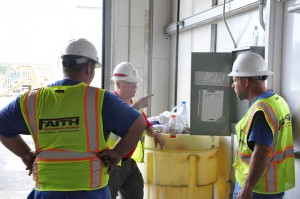 An individual that specializes in industrial electrical work is directly responsible for installing, maintaining, testing, troubleshooting, and repairing various types of electrical equipment, electric-based appliances and machinery, and electronic controls on a wide assortment of equipment models that are commonly located within a plant, commercial building or an industrial site. The actual description of the jobs performed, the duties, and the responsibilities vary, based on the employer; however, in most instances, the industrial electrical work professional will either work within construction or within a position that is responsible for maintaining the existing electrical-based systems within the company. Most individuals that perform this type of work in the industrial automation industry will receive their training through a specially-designed apprentice program; however, there are many that receive their training through a combination of college education, technical school, and/or an apprentice program.
An individual that specializes in industrial electrical work is directly responsible for installing, maintaining, testing, troubleshooting, and repairing various types of electrical equipment, electric-based appliances and machinery, and electronic controls on a wide assortment of equipment models that are commonly located within a plant, commercial building or an industrial site. The actual description of the jobs performed, the duties, and the responsibilities vary, based on the employer; however, in most instances, the industrial electrical work professional will either work within construction or within a position that is responsible for maintaining the existing electrical-based systems within the company. Most individuals that perform this type of work in the industrial automation industry will receive their training through a specially-designed apprentice program; however, there are many that receive their training through a combination of college education, technical school, and/or an apprentice program.
Job Skills and Career Values
Individuals that work in the industrial automation industry as industrial electrical work professionals have a wide array of job skills and career values that place them exceptionally high on the list of desired professionals for commercial-based businesses, plants, and industrial companies. The following outlines the most basic responsibilities, skills, and values exhibited by an industrial electrician:
- These professionals have the training necessary to both read and interpret a wide assortment of drawings, various types of blueprints, and code specifications that directly pertain to electrical work.
- An industrial electrical work professional installs and examines electrical wiring on a regular basis. Replacement and repairing that wiring is also a necessity. In addition to concluded these tasks with electrical wiring, electrical receptacles, conduits, electrical switch boxes, electrical feeders, lighting fixtures, case assemblies, and various other types of electrical components and features are regularly installed, examined, replaced, and/or repaired by these professionals.
- The professional will regularly test various types of equipment and components that are electric-based or electronic-based.
- Analyzing and solving problems is a common task performed by those that work in industrial automation.
- Professionals that specialize in industrial electrical work are often highly knowledgeable on motors, industrial-based storage batteries, generators, and a variety of electrical-based control systems.
- Maintenance, repairs, and testing of components such as transformers, regulators, switchgears, reactors, and switchboard meters are common tasks performed by these types of engineers.
Education and Training
In order for an individual to become a professional in industrial electrical work, education and training is required. First, high school must be completed successfully. Most employers that work in industrial automation want their electricians to have a large amount of credits in both math and physics. An apprentice program is typically required. Most of these programs include several thousand hours. The apprenticeship provides academic training and on-the-job training hours. Immediately thereafter, the individual takes an examination that tests their skills and knowledge. Successful completion of this examination will render the trainee with a “Certificate of Qualification”. Once this is obtained, the professional will be able to choose from numerous jobs. Examples include those that pertain to electrical construction, steel producers, motor vehicle manufacturers, vehicle parts manufacturing, power companies, and mining companies. By hiring an industrial electrical work professional, you are hiring an individual with a thorough and comprehensive amount of training, skills, and education to perform the tasks that you require.
